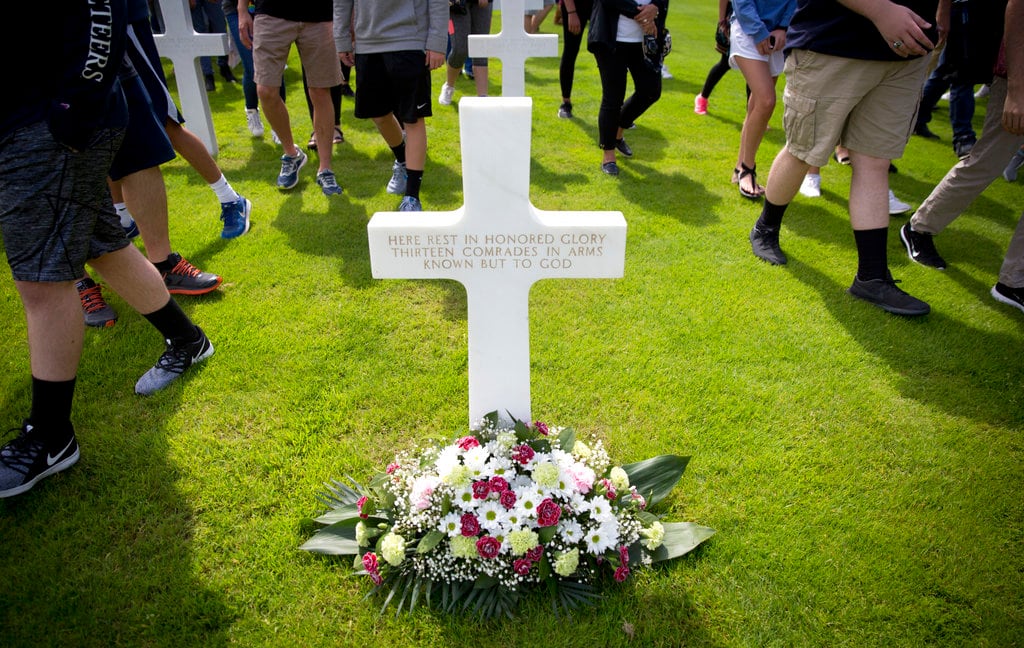source GAIA package: Sx_MilitaryTimes_M6201310312090023_5675.zip Origin key: Sx_MilitaryTimes_M6201310312090023 imported at Fri Jan 8 18:18:12 2016
Editor's note: Filmmaker Stanley Kubrick's classic "Full Metal Jacket," which depicts Marine Corps recruit training at Parris Island, S.C., during the Vietnam War and follows the main character into combat, airs on the IFC network Thursday, Dec. 12, at 8:15 p.m. Eastern. Actor Matthew Modine, who played the film's protagonist, Pvt. J.T. "Joker" Davis, will be tweeting with Marine Corps Times readers throughout the event. Follow and tweet him your questions at@FMJDiary. Most important: Use the hashtag #FullMetalJacket. We'll be aggregating the discussion, in real time, right here at marinecorpstimes.com/fullmetaljacket. One lucky participant will win an autographed copy of the film's 25th anniversary edition on Blu-ray.
by @FMJDiary
!function(d,s,id){var js,fjs=d.getElementsByTagName(s)[0],p=/^http:/.test
(d.location)?'http':'https';if(!d.getElementById(id)){js=d.createElement(s);js.id=id;js.src=p
+"://platform.twitter.com/widgets.js";fjs.parentNode.insertBefore(js,fjs);}}(document,"script","twitter-
wjs");
Pvt. Joker reflects on iconic film role
Twitter is an incredible thing. Don't believe anyone who tells you otherwise.
It's also a journalist's best friend.
Case in point: It was a Sunday night in late November and, in spite of the drama unfolding during the Patriots-Broncos game, I was distracted by my iPhone. On Twitter, I came across an announcement from actor R. Lee Ermey, a name Marines instantaneously recognize as the fabled drill instructor, Gunnery Sgt. Hartman, in filmmaker Stanley Kubrick's 1987 classic "Full Metal Jacket."
"Watch #Kubrick's #FullMetalJacket tomorrow night on @IFC!" it read, alluding in Twitterspeak to the Independent Film Channel as well as the film's other principal actors: @MatthewModine and @vinniedonofrio. Modine, of course, played Pvt. J.T. "Joker" Davis, the protagonist. D'Onofrio was his slovenly platoon mate at boot camp, the tragic Pvt. Leonard "Gomer Pyle" Lawrence, who eerily spoke the film's namesake — "Seven-six-two millimeter. Full. Metal. Jacket." — before taking Hartman's life and his own inside their squad bay's head.
I shared Ermey's tweet with my Twitter followers, many of whom are Marines, indicating it was "Gunny's orders" to tune in for the movie. Modine shared mine, a brief discussion ensued and two weeks later, boom, Marine Corps Times is publishing a Q&A with Pvt. Joker. The timing could not have been more fortuitous, considering this week's cover story, in which Ermey, a retired gunny who keeps close tabs on the Corps, proffers his ideas for addressing some of the service's most vexing challenges.
Completely random — and awesome.
Modine was 24 years old when "Full Metal Jacket" began filming. Today, he's 54 and still active in Hollywood, though his home is in New York City. Among is his most recent projects is a new iPad app called "Full Metal Jacket Diary," a digital recreation of his limited edition book titled the same.
In the movie, Modine's character completes recruit training at Parris Island, S.C., and promptly ships to Vietnam, where, as a Marine combat correspondent, he is assigned to document the war for Stars and Stripes newspaper. So Joker was a journalist. I had to ask: What he think of Twitter?
"He'd probably write for the Onion," Modine said, referring to the satirical media organization that spoofs real news and pokes fun at the absurdities of popular culture. "You know, the quips. 'Does this mean Ann-Marget's not coming anymore?' 'Only after you eat the peanuts out of my sh--.' I think both of those would fit quite well into a 140-character tweet.
Here's the rest of our interview. Some of these questions were inspired by readers who follow Marine Corps Times on Facebook and, of course, Twitter.
Q. How did you research the role of Pvt. Joker, and what surprised you most about the Marine Corps and Marine culture?
A. The research began when I was about 8 years old. That is when my oldest brother, Mark Jr., joined the Navy and went to Vietnam. That's when the war came home for me and my family. There is a military history in my family. My father was in the Merchant Marines. Bad eyesight had prevented him from joining his brother, my Uncle Wylder, in the 8th Army Air Force in World War II. Their father was in the U.S. Cavalry during World War I. War culture seems to be a part of the character of most Americans and perhaps even a part of our DNA. What I have come to appreciate about the Corps and the men and woman that serve, is their one-of-a-kind camaraderie. The training creates a bond that I have not seen in any other walk of life. When a Marine says "I got your back," you can be sure they do.
Q. What lessons within "Full Metal Jacket" are still relevant today?
A. That drill instructors, like the character, Gunnery Sergeant Hartman, are not the "bad guy." In a lesser filmmaker's hands, Hartman may have been perceived as an evil character. I think Kubrick made it clear that war is the enemy. I don't think, given a choice, that Marines want to go to war. But when it is necessary, these young men and woman have to be prepared to face the fears and hardships that come with battle. Hartman's job, his duty, was to "weed out" those that could not face the challenge. So, as hard as Hartman was, those individuals that survive the training soon discover how important the lessons taught to them become. How life saving they are.
Q. How did Stanley Kubrick immerse himself in the Marine Corps experience while making this film, and to what extent did he rely on people like R. Lee Ermey, those who spent time in the Corps? We'd like to get a sense for his process, and how he leveraged the technical expertise of those who've worn the cloth.
A. It certainly was beneficial to have Ermey with us. His knowledge of basic training was vital for the authenticity of the film. Kubrick also employed the knowledge of the author, Michael Herr. Michael is the author of "Dispatches," a novel which many consider to be one of the best books about war ever written. He also had Gus Hasford, author of "The Short Timers," about which "Full Metal Jacket" is based. In addition to these three, Kubrick immersed himself in studying the history of the war. But not just the Vietnam war. All wars. This is why "Full Metal Jacket" has a universal appeal and much greater depth and significance than other war films. It is not a film that generalizes but provides a comprehensive study of war and the combat training of Marines.
Q. Did you ever get the duality of man issue squared away?
A. Still working on that, sir.
Q. In your imagination, what did Joker do with his life after the war?
A. I think Joker, like so many other survivors, carries the scars of war that cannot be seen on the flesh. The deep psychological cuts that Joker experienced will have left him carrying the burdens that I am not entitled, or sanctioned, to discuss. These physiological scars are things only those that have been there, seen, and lived through can discuss.
Q. "Full Metal Jacket" is such a quotable movie. What's your favorite line or exchange and why?
A. I like the scene when Animal Mother and Joker first meet at the Pagoda. I really wanted to get an additional John Wayne impression in the film, and Kubrick and I worked on the dialogue together to make it happen.
Q. R. Lee Ermey is spot-on in his depiction of the fabled drill instructor Gunny Hartman. When you first saw him in action, what did you think?
A. Just that. That Ermey was the real deal. When he got in your face — with his too much coffee, too many cigarettes, a lot of nervous performance tension, hot and moist breath — and started barking his lines, well, let's just say, there wasn't much acting his victims had to do. You just held on and went for the ride.
Q. How did making this movie change you? What did you experience that you've applied to the rest of your life?
A. I'm proud that the film has done, globally, so amazingly well. It is Kubrick's biggest commercial success. More than that, I am happy that I am kind of an honorary Marine. That special privilege has given me unique access to organizations like the Wounded Warrior Project. I could have just been a citizen that supports an important charity like that, but "Full Metal Jacket" and my role allows me to be in a privileged position to support their goals.
Q. Plenty of Marines joined the Corps because of how much they enjoyed this film. What does that mean to you?
A. To be honest, I can't say I'd watch "Full Metal Jacket" and then say "I want to be a Marine."
Q: Do you ever show your war face these days, just for the hell of it?
A. Ha. Yeah. I'm a New York Rangers fan. At most games at Madison Square Garden, during a break in the action, they'll put up the scene where Gunny Hartman says "Let me see your war face!" and then they cut to the fans screaming. If I happen to be at the game when they do this, they'll inevitably put the camera on me and I gotta give it up. I scream like all hell!
More on 'Full Metal Jacket Diary'
In 2005, Modine published a limited edition hardcover book about his experience portraying Pvt. J.T. "Joker" Davis in Stanley Kubrick's classic "Full Metal Jacket."
"Full Metal Jacket Diary" contains dozens of his photos and journal entries documenting life on the set and other personal observations about the production. His character in the film was a Marine combat correspondent reporting and writing for Stars and Stripes newspaper. So to Modine, it made sense to chronicle what he saw.
"There were times when Stanley asked me to share with him what I was writing," Modine said. "That encouraged me to keep good notes and be as articulate and accurate as I could. It was a good exercise. The more astonishing thing is that he allowed me to take photographs on the set because that was something that was not really allowed. Not only was it an honor, but it was quite flattering because he was an extraordinary photographer himself."
Only 20,000 copies of the diary were published — and that's how he wanted it, said Adam Rackoff, who has now reinvented the book as an interactive iPad app narrated by Modine. They call it an "app-umentary," and it's available via Apple's iTunes for $10.
"Matthew wanted these special metal-encased books to become valuable collectors items," Rackoff said. For that reason, and despite demand from his fan base, Modine said no to a paperback re-issue.
The app is cinematic, featuring originally composed music and sound effects. You don't read it so much as experience it. And don't go confusing this with the bonus material you can find on a DVD or Blu-ray of the movie. By contrast, the diary is a nuanced, deeply personal behind-the-scenes account of how "Full Metal Jacket" was made and what it was like to be a young actor on that set, working alongside "arguably, one of the greatest filmmakers ever to get behind a motion-picture camera," Modine said.
"Matthew's criteria for creating the app was that every aspect had to be up to the quality of a Stanley Kubrick film," Rackoff added. "He demanded that the app be something Kubrick would be proud of. I believe we've accomplished that."
Learn more: fullmetaljacketdiary.com.





